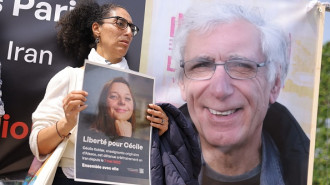Cuba to test Covid vaccine in hard-hit Iran
State-run Finlay Vaccine Institute (IFV) and the Pasteur Institute of Iran signed an agreement in Havana that will see a Phase 3 clinical trial in Iran, to "move forward faster in immunisation against Covid-19 in both countries," the IFV announced on Twitter.
The Islamic republic has reported more than 1.2 million cases of the novel coronavirus, which have caused over 56,000 deaths.
It has accused arch-enemy the United States of hampering its access to vaccines through a tough sanctions regime.
The Sovereign 02 is the country's most advanced coronavirus vaccine candidate, showing "an early immune response (at 14 days)," IFV Director Vicente Verez said in December.
It has been difficult to do Phase 3 clinical testing in Cuba because its outbreak has not been as serious as those in many larger countries, he said.
Although cases in Cuba are increasing due to the opening of its borders, the country of 11.2 million has seen about 14,000 cases and 148 deaths, lower figures than its neighbours in the region.
The Americas' only Communist-ruled state wants to have its entire population immunised with its own vaccines by the first half of 2021.
The Center for Genetic Engineering and Biotechnology is working on two other vaccine candidates, called Mambisa and Abdala.
Cuban scientists have experience in developing and manufacturing vaccines. The national childhood vaccination program has 11 vaccines against 13 diseases, eight of which are manufactured on the island.
The news came on the heels of Iran's supreme leader on Friday banning the import of American and British-produced vaccines against Covid-19, saying they were "completely untrustworthy."
Ayatollah Ali Khamenei said in a tweet, accompanied by the hashtag #CoronaVaccine.
Twitter Post
|
"Importing vaccines made in the US or the UK is prohibited. They're completely untrustworthy. It's not unlikely they would want to contaminate other nations," said a tweet posted on Friday on Khamenei's English-language Twitter account.
"Given our experience with France's HIV-tainted blood supplies, French vaccines aren't trustworthy either," the Iranian leader added in the tweet with the hashtag #CoronaVaccine.
Twitter later removed the tweet and replaced it with a message that said it was "no longer available because it violated the Twitter Rules”.
Khamenei's tweets are managed by his office and usually contain statements he made during sermons, which are later published by Iranian media.
The English-language account @khamenei_ir has more than 873,000 followers, including the verified accounts of top Iranian officials such as Rouhani and Foreign Minister Mohammed Javad Zarif.
France was singled out by Khamenei on Friday because of a scandal in the 1980s in which blood infected with HIV was distributed in France, and later abroad. Hundreds of people in Iran were among those infected.
Khamenei's ban concerns vaccines made by pharmaceutical giants Pfizer of the US and its German partner BioNTech, American firm Moderna and the vaccine produced by multinational company AstraZeneca and Britain's Oxford University.
The World Health Organization granted emergency validation to the Pfizer-BioNTech vaccine at the end of December.
The WHO's experts and others found the vaccine to hold "the must-have criteria for safety and efficacy set out by WHO and that the benefits of using the vaccine to address Covid-19 offset potential risks", it said.
Agencies contributed to this report.
Follow us on Facebook, Twitter and Instagram to stay connected

![Palestinians mourned the victims of an Israeli strike on Deir al-Balah [Getty]](/sites/default/files/styles/image_684x385/public/2024-11/GettyImages-2182362043.jpg?h=199d8c1f&itok=xSHZFbmc)


![The law could be enforced against teachers without prior notice [Getty]](/sites/default/files/styles/image_684x385/public/2178740715.jpeg?h=a5f2f23a&itok=hnqrCS4x)
 Follow the Middle East's top stories in English at The New Arab on Google News
Follow the Middle East's top stories in English at The New Arab on Google News

![The law could be enforced against teachers without prior notice [Getty]](/sites/default/files/styles/image_330x185/public/2178740715.jpeg?h=a5f2f23a&itok=xMdFOAIF)
